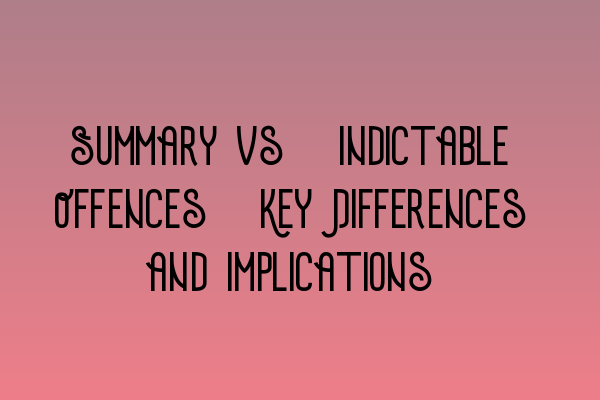Summary vs. Indictable Offences: Key Differences and Implications
When it comes to criminal offences, there are two basic categories: summary offences and indictable offences. Understanding the differences between these two types of offences is crucial for anyone involved in the criminal justice system, including solicitors, barristers, and law enforcement professionals.
Summary Offences
Summary offences are less serious crimes that are generally heard and adjudicated in the Magistrates’ Court. These offences are usually less complex and carry lower maximum penalties compared to indictable offences. Some common examples of summary offences include minor assaults, public order offences, and low-value thefts.
One of the key characteristics of summary offences is that they are tried and decided by a magistrate without a jury. In cases where a guilty plea is entered, the magistrate will determine the appropriate sentence. However, if the accused pleads not guilty, the case may proceed to trial in the Magistrates’ Court. In some instances, the accused may have the option to elect for a trial by jury in the Crown Court.
Summary convictions are generally considered to be less severe and can often result in fines, community orders, or short custodial sentences. These offences are usually disposed of more quickly, and the emphasis is on achieving a swift resolution.
Indictable Offences
Indictable offences are more serious crimes that are typically heard in the Crown Court before a judge and jury. These offences carry higher maximum penalties and often involve complex legal issues and evidence. Examples of indictable offences include murder, rape, and large-scale fraud.
Unlike summary offences, indictable offences are subject to more formal and lengthier procedures. The accused is entitled to a trial by jury, where the jury determines guilt or innocence based on the evidence presented. If a guilty verdict is reached, the judge decides on the appropriate sentence.
Due to their seriousness, indictable offences often require extensive preparation, investigation, and legal representation. The legal process involved in indictable offences is inherently more complex and demanding, which is why it is crucial for legal professionals to have a deep understanding of the law and procedure relating to these offences.
Implications for Legal Professionals
As a solicitor or barrister, it is essential to have a firm grasp of the differences between summary and indictable offences. This understanding allows you to provide accurate advice and representation to your clients, ensuring they receive the appropriate legal support throughout their case.
Summary offences often involve minor legal issues and can be resolved quickly. However, your expertise in analyzing evidence and negotiating with the prosecution can make a significant difference in achieving favorable outcomes for your clients. It is crucial to identify any weaknesses in the prosecution’s case and present a strong defense strategy.
Indictable offences, on the other hand, require a higher level of expertise and resources. Thorough investigation, legal research, and strategic planning are essential to navigate the complexities of these cases. Building a strong defense, challenging evidence, and presenting compelling arguments are crucial in securing the best possible outcome for your clients.
To develop a solid understanding of criminal law and practice, it is recommended to undertake SQE 1 preparation courses. These courses offer comprehensive knowledge and preparation for the SQE 1 exam, covering various legal areas, including criminal law. Additionally, practicing with SQE 1 practice exam questions and SQE 1 practice mocks can help you assess your knowledge and sharpen your skills before the exam.
Once you have successfully completed SQE 1, you can focus on refining your criminal law expertise through SQE 2 preparation courses. These courses are specifically designed to enhance your knowledge and practical skills in areas such as advocacy, dispute resolution, and criminal litigation.
Stay up-to-date with the latest SRA SQE exam dates to ensure you plan your exam preparation effectively and stay ahead in your professional journey.
In conclusion, understanding the differences between summary and indictable offences is crucial for legal professionals involved in criminal law. By having a sound knowledge of the law and procedures related to these offences, you can provide effective advice and representation to your clients. Keep honing your skills through comprehensive preparation courses and practice exams to excel in your legal career.
